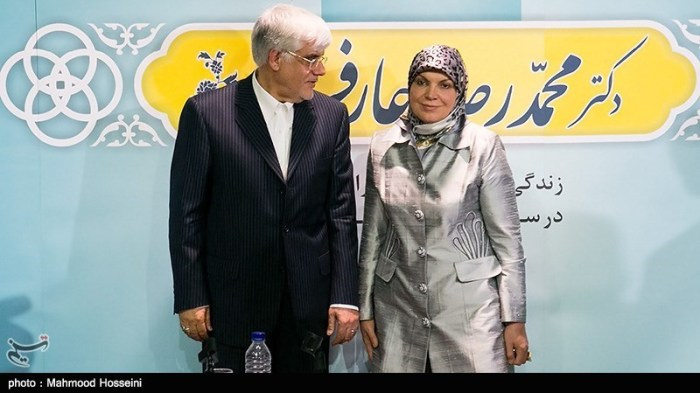Iranian Reformists and February Parliamentary Elections

(Photo: Mohammad-Reza Aref and his wife Hamideh Moravvej during the 2013 presidential campaign. Aref resigned from the competition four days before the polls.)
On Sunday, November 8, 2015, the establishment of the Supreme Reformist Council for Policy-Making was announced. The council is headed by Mohammad-Reza Aref, the Vice-President during Khatami's second term of presidency (2001-2005). Mousavi Lari and Mousavi Tabrizi will serve as deputies and Elaheh Koulaei and Elham Fakhari were elected as secretaries. Will the new council serve as the main platform for the upcoming parliamentary elections in February 2016? Heshmatollah Falahatpisheh, a Principlist activist, takes a look at the chances of the rival camp, the Reformists, in the elections [important note: while in analyses of Iran's domestic politics, Kargozaran, a party founded in mid-1990s and affiliated with Akbar Hashemi Rafsanjani, is generally regarded as a Reformist party, Fallahatpisheh distinguishes between Kargozaran and the orthodox faction of the Reformist front which is closer to former president Mohammad Khatami]:
With their pragmatist approach, Kargozaran will have doubts if Reformist figures should be slated as flagship candidates in the parliamentary elections. This hesitation can undermine the alliance between Aref and Rouhani.
Pragmatism is the main point of difference between Kargozaran and their Reformist partners. For Kargozaran, alliance is always an option. But the Reformist front is less inclined towards coalition with other political groups, unless space for political maneuver is significantly limited or there is no chance for direct participation in political competitions (like what we witnessed during the 2013 presidential election). This sort of reluctant political partnership inevitably leads to differences. Currently, there are Reformists who complain that their endorsement was the key factor that led to Rouhani's victory in the presidential election, but they did not reap the benefits.
In comparison, Kargozaran regard the administration closer to their ideals, and view it as a Kargozaran government. The composition of the cabinet proves that Rouhani's administration tilts towards Kargozaran rather than the Reformists. That has led some Reformist members to start a political campaign for the upcoming parliamentary election and also the next presidential poll.
A number of figures who have recently formed the Supreme Council for Policy-Making are basically seeking a way to preserve the Reformist identity, and to use it as a platform for the next presidential election. It is important to know that the Reformist front is strongly concerned about being barred from the upcoming parliamentary election. Unlike the presidential election, they have no heavyweight figures that can run for the parliament. In this context, the Supreme Reformist Council for Policy-Making appears to be a platform whose main purpose relates to the 2017 presidential poll. For the parliamentary election, the Reformist front most probably ponders negotiations with other groups, including forces close to the government.
If the next parliament fails to satisfy the Reformists, they will be more determined to participate in the next presidential election with an exclusive candidate. This candidate will probably be Mohammad-Reza Aref. Although there are speculations about Aref taking the position of the next parliamentary speaker, this scenario is hardly likely. Most probably, in the period between the parliamentary election and the presidential election, we will witness the Reformists' disillusionment with Hassan Rouhani.
At this juncture, Kargozaran believe that uniting with moderate Principlists can help form a parliament that is friendlier with and less hostile towards the government than the 9th parliament that is serving at the moment. However, Reformists, especially those for whom the identity of the Reformist movement bears significant weight, are against alliance with moderate Principlists. The difference between this attitude and the pragmatist viewpoint of Kargozaran will doom Kargozaran's efforts to form its desirable slate.
As said earlier, the problem for the Reformists is that they may not be able to groom their preferred candidates for the election. On the other hand, Kargozaran, with their more inclusive and pragmatist approach, can join forces with moderate Principlist candidates and participate in the Majles elections more powerfully. Up to now, many political figures of the Reformists have fallen victim to their camp's heavily identity-oriented attitude. There will be more victims if this attitude persists.
* This piece was originally published in Fararu, a moderate website affiliated with Tehran mayor Mohammad-Bagher Ghalibaf. Changes in terms of length and style have been applied to the translation.

